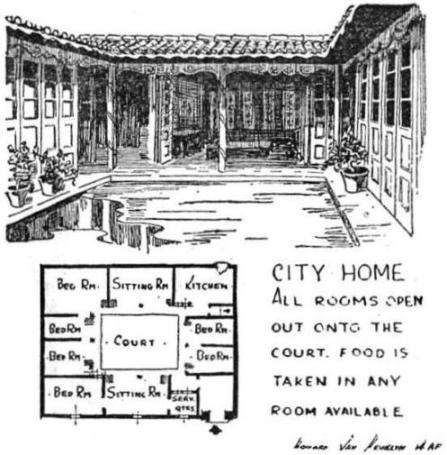
|
|
|
HQ., 14TH AIR FORCE, CHINA - Destruction of Japanese transportation facilities and supply routes has long been a No. 1 priority for the famous "Jiggs" Squadron, Falcon Medium Bomber Group of the Fourteenth Air Force operating in China. But until last week never before had one plane accomplished both with one bomb. It happened in French Indo-China on a Jap-run railroad line.
With instructions to destroy this large strategic railroad bridge, at Nink Bink, one of the planes attacked this installation. Employing the very effective "Glip" bombing tactics, recently developed by the Falcon Group, the plane neatly dropped one 1,000 lb. demolition bomb and scored complete destruction of the main span of this bridge and sank a 100-foot supply boat that was passing under at the time. With another bomb the pilot then destroyed the remaining span.
The fighting Jiggs Squadron is commanded by Lt. Col. Charles G. Willes and is the oldest medium bombardment squadron blasting the Japs in China.
China's War Production In High Gear; U.S. Experts Here
CHUNGKING (By Air Mail) - The first four months of China's War Production Board were reviewed here this week by Dr. Wong Wen-hao, who is both minister of economic affairs and WPB chairman.
The board has stepped up the production of such items as coal as much as 28 percent in the four-month period. It has contracted for the manufacture of land mines, steel bayonets, mortar shells, picks and shovels in large quantities. It has introduced a process for producing coke which cuts down the production time from a week to 48 hours. It is now installing generators to provide more electric power in the three main producing centers of Kunming, Chengtu and Chungking. The goal for steel production in 1945 is three times the production of 1944.
The WPB report was made at an occasion honoring Howard Coonley, who has been Dr. Wong's chief advisor for the past four months and is now returning to America. Coonley was left here by Donald M. Nelson as his personal deputy. Another former member of the U.S. War production Board, A. T. Kearney, will succeed Coonley as advisor to Dr. Wong.
Over 20 American technical specialists are now arriving in China to assist in carrying out the program of production. WPB does no manufacturing on its own. Dr. Wong reported that his board had been able to stimulate production of tools, bayonets and mines and shells by contracting with industrial plants making loans in advance, aiding in stockpiling raw materials, leasing processing equipment, and standing guarantor for any emergency financial strain. WPB hopes to assist during 1945 in the manufacture of iron, steel, coal and coke, chemicals, electrical equipment, machine tools, textiles, dehydrated and other prepared foods.
Part of WPB's control over contracts and production streams from its position as chief handler in China of American lend-lease goods. It handles the priorities on procurement and distribution, scans every request which goes to Washington and except for finished armaments, receives the supplies on delivery in Kunming and allocates them. WTB has held that function since March 1.
|
Indo-China Spans
A FOURTEENTH USAAF BASE IN CHINA - Continuing its hard hitting tactics, the far-ranging "Ringer" squadron of the Falcon bomb group has again hit pay dirt.
Close on the heels of the recent achievement of four bridges destroyed and three damaged in one day, which brought a commendation from Maj. Gen. C. L. Chennault, reading in part, "I do not recall a single attack by such a small force which accomplished such devastating results." The squadron in 45 minutes recently added three more bridges destroyed to its toil.
Winging deep into Indo-China, the "Ringers" moved in swiftly, dropping three important rail and highway bridges into the water. The targets hit were all of steel construction, concrete reinforced, and varied in length of three to five spans. In addition, one other bridge was badly damaged. Continuing their attack, rail lines and centers were strafed.
In recent weeks the "Ringers" have accounted for 12 bridges down and nine bridges severely damaged. Most of the installation demolished were vital links along the all important coastal railroad connecting Lang Son, Hanoi and Vine.
This is a portion of the main artery by which the Japanese transport military supplies from the homeland and Manchuria to their forces in Burma and carry raw materials back to Japan from Malaya and Indo-China.
JAP GENERAL SAYS SO SORRY; GOES BOOM
SAN FRANCISCO (ANS) - The Japanese Domei News Agency broadcast Wednesday said that Lt. Gen. Tadamichi Kuribayashi, commander of the Japanese garrison on Iwo Jima was killed Saturday after he had sent "most profound regrets" to the Emperor for the loss of the strategic island.
JAPS ADMIT WEIGHT OF TOKYO RAIDS
GUAM (ANS) - The Tokyo Radio, in one of the frankest broadcasts yet made on the results of the B-29 raids, admitted Tuesday that American air attacks on the homeland were causing even greater damage than the heaviest raids on Germany. It said that the March 10 raid on Tokyo started a series of fires which swept away whole districts and said "during the night we thought the whole of Tokyo had been reduced to ashes. The city was as bright as sunrise."
Mansfield Praises Work Of China GIs
KUNMING - In a letter to the China Lantern Congressman Mike Mansfield, Representative from the First District of Montana paid tribute to the tremendous effort against overwhelming odds which is being put forth by officers and enlisted men serving in the China and India-Burma Theaters.
Mansfield, who recently completed a report to Congress of a trip which carried him to every corner of free China as well as India, and to the fighting front in Burma, said the GIs in China, Burma and India get "far too little recognition for the tremendous job they are doing so many thousands of miles from home."
Congressman Mansfield also paid tribute to the USO and Army entertainment units which have traveled extensively in China, India and Burma.
Speaking in Congress, Mansfield said, "I would like to say a good word for some of the USO shows which have traveled to China. This may seem out of place here, but you would be surprised at the way the morale of the boys and girls - because there are girls there too - is lifted by some of these theatrical troupes."
Mansfield singled out the
|
Mansfield, the only member of Congress who has served in the Army, Navy and marines, traveled the length of the Ledo Road from Ledo to Myitkyina by jeep talking to thousands of GIs along the road. He also flew the "hump" and conferred with high ranking Chinese and American officials in Chungking, Kunming and other bases.
Returning to Washington, Mansfield said he would attempt to bring the Far Eastern Theaters of operations into their proper place as vitally important areas in the Allied war effort.
Indo-China French Poorly Equipped
CHUNGKING, March 22 - A number of facts about the situation in Indo-China came to light in Chungking with the return of a Chinese observer who has recently arrived from China's southern border.
The strength of the opposition to the Japanese military control in Indo-China totals 10,000 French troops and unnumbered Indo-Chinese organized as guerillas.
The French troops, under the command of ex-Governor Jean Decoux, are stationed in four military districts. But they are poorly equipped. Fifty cannon which they formerly had have been organized in anticipation of Allied landings and both French and Indo-Chinese are ready to support such landings with internal uprisings and by hampering the enemy's communication lines.
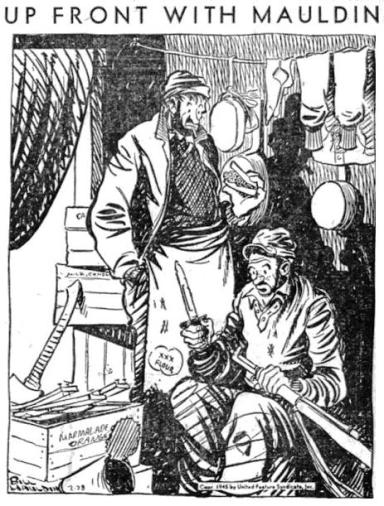
|
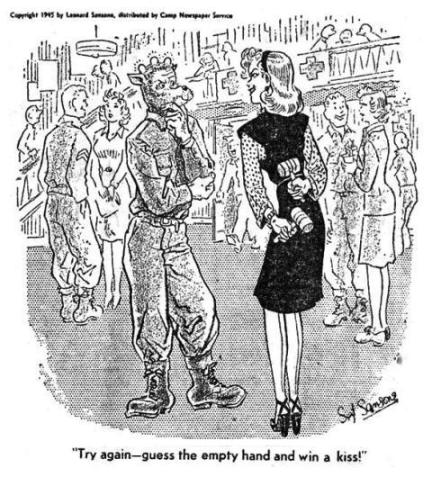
|
IWO JIMA SAVES 30 SUPERFORTRESSES
GUAM (ANS) - Iwo Jima has saved about 30 Superfortresses and their crews from probable destruction, the XXI Bomber Command reported last week. A spokesman said planes returning from three great incendiary raids on major Japanese industrial cities landed at Iwo to refuel or for emergency repairs.
Without the island, he said, most of them never would have reached Marianas bases. The lives of approximately 330 men were at stake in the big bombers.
Makes One Rescue, Crashes On Second
By HUGH A. CRUMPLER (United Press War Correspondent)
HQ., EASTERN AIR COMMAND, INDIA - Maj. Matthew Gordon of Pueblo, Colo., P-51 pilot of the India-based Fourteenth Army unit in the Arakan ......... when a message came in that an American fighter pilot had bailed out near the Japanese lines in Central Burma.
Maj. Gordon commandeered a tiny L-5 plane kept at the base for liaison work. He flew to the radioed location, landed in a rough paddy field and picked up the downed pilot almost before the plane stopped rolling.
Gordon, who has had three years overseas service, flew the pilot back to safety.
A few hours later a radio message was received that a second pilot had bailed out because of engine trouble. Gordon again took off in the L-5.
This time, however, he couldn't find the pilot. He circled the area until dark, then set out for a nearby landing field.
Mistaking flashlight signals from the ground for signals to land, he crashed into a tree top. He received serious head injuries. After first aid treatment he was evacuated by air to an American hospital.
"Naturally, I'd do it again," Maj. Gordon said, "but the irony of the whole thing is that the second pilot was rescued by British troops as soon as he hit the ground."
Burning Of People Ordered By Tokyo
SAN FRANCISCO (ANS) - The destruction of Manila by the Japanese Imperial marines followed direct orders from Tokyo. Brig. Gen. carols P. Romulo, resident commissioner on the Philippines said last week, "the rape of Nanking was a primeval instinct of the Japanese asserting itself. Manila's destruction was studied and systematic. In the walled city of Intramuros, the Japanese herded 1,700 male civilians, doused the fort with kerosene and burned it. Only three escaped. Women and children streamed through a wall-breach from United States artillery and the Japanese mowed them down with machine guns. We have captured documents to prove this was all on direct orders from Tokyo. I am going to read them on the floor of Congress."
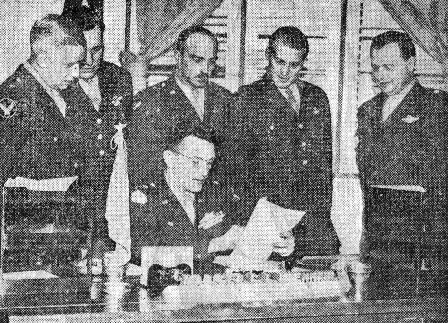 TACTICAL COMMANDERS of the famed "Flying Tigers" met recently with Maj. Gen. C. L. Chennault, commanding
general of the Fourteenth Air Force, during the observance of the Fourteenth's second anniversary. Grouped about
the general at his desk are, left to right: Brig. Gen. Russell E. Randall, Merrick, N.Y., commanding general of a
northern China fighter wing; Brig. Gen. Winslow C. Morse, commanding general, Chinese-American Wing; Brig. Gen.
John C. Kennedy, Benniagton, Vt., commanding general of a Fourteenth composite wing; Col. Clayton B. Claassen,
Galveston, Tex., wing commander; Brig. Gen. Albert F. Hegenberger, Boston, Mass., Chief of Staff.
TACTICAL COMMANDERS of the famed "Flying Tigers" met recently with Maj. Gen. C. L. Chennault, commanding
general of the Fourteenth Air Force, during the observance of the Fourteenth's second anniversary. Grouped about
the general at his desk are, left to right: Brig. Gen. Russell E. Randall, Merrick, N.Y., commanding general of a
northern China fighter wing; Brig. Gen. Winslow C. Morse, commanding general, Chinese-American Wing; Brig. Gen.
John C. Kennedy, Benniagton, Vt., commanding general of a Fourteenth composite wing; Col. Clayton B. Claassen,
Galveston, Tex., wing commander; Brig. Gen. Albert F. Hegenberger, Boston, Mass., Chief of Staff.
|
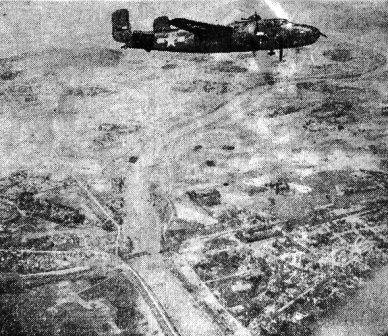 SURVEYING ITS KILL - A B-25 from the "Bombing Bulldog" Squadron of the Fourteenth Air Force, flies over the
Phu Lang Thuong railroad bridge which has just been demolished by this squadron in French Indo-China. The Bulldogs
are commanded by Lt. Col. Philip Main, Barry, Ill., and are playing havoc with Japan's overland supply routes.
SURVEYING ITS KILL - A B-25 from the "Bombing Bulldog" Squadron of the Fourteenth Air Force, flies over the
Phu Lang Thuong railroad bridge which has just been demolished by this squadron in French Indo-China. The Bulldogs
are commanded by Lt. Col. Philip Main, Barry, Ill., and are playing havoc with Japan's overland supply routes.
|
DUPLICATE PRIZES FOR "LANTERN" WINNERS
Duplicate prizes were awarded to Sgt. J. R. Goodman and Sgt. George Fenton for the new name for the China Theater newspaper. Both Goodman and Fenton submitted "The China Lantern" and each will receive a $100 War Bond.
Over 5,000 entries were received by the judges who finally selected the name now appearing on the masthead.
|
Maj. Gen. Curtis Emerson LeMay, who switched from the leadership of the XX to the XXI Bomber Command last January, has hit the Axis from one end to the other with the heaviest types of available bombers.
He organized a B-17 group and took it to England in the early days of the Eighth Air Force's
|
WHO'S SETTING JAPAN ON FIRE |
At the time he reached that rank, he was the youngest major general in the entire Army. (At least until very recently he was still the youngest in the AAF.) He was 38 years old last November.
Assigned to command the XX Bomber Command last August, he introduced offensive formations such as he had found so effective in Europe. He also inaugurated a rigid training program in which his most experienced crewmen were required to do more flying than they had in cadet training. Another essential of his program was a perfect, or quasi-perfect, maintenance record. Under the LeMay system the double-X rapidly increased the rate of operations, the weight of bombs dropped, and the effectiveness of bombing.
As commanding general of the XXI, he has sent his units out to accomplish that type of warfare which has been predicted and earnestly desired ever since it has been evident that we must fight Japan - mass incendiary attacks by super-bombers upon the Japanese mainland.
A native of Columbus, Ohio, Gen. LeMay is a graduate of Ohio State University. Like many another prominent bombardment man, he was first a fighter pilot; but he has been with the four-engine bombers ever since America has had them, joining the first experimental B-17 unit back in 1937.
He holds the DSC, DSM, DFC, Air Medal, Silver Star, British DFC, Russian Order of the Patriotic War, Brazilian Order of the Southern Cross, Mackay Trophy ribbon, European and Asiatic-Pacific ribbons, and American Defense ribbon.
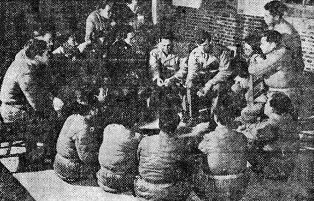 U.S. ARMY LIEUTENANTS discussing with their Chinese students topics suggested by the eager and attentive
group gathered around them.
U.S. ARMY LIEUTENANTS discussing with their Chinese students topics suggested by the eager and attentive
group gathered around them.
|
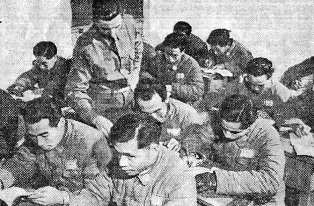 ENGLISH COMPOSITION CLASS in which the Chinese students "brush-up" on their English and learn conversation
in military terms. Their study here makes them expert interpreters in the U.S. training program for the Chinese
Army.
ENGLISH COMPOSITION CLASS in which the Chinese students "brush-up" on their English and learn conversation
in military terms. Their study here makes them expert interpreters in the U.S. training program for the Chinese
Army.
|
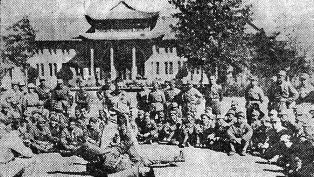 PHYSICAL TRAINING is part of the curriculum at the Interpreters School. Here the champion wrestlers of two
platoons compete for the title, with two American athletic instructors as referees.
PHYSICAL TRAINING is part of the curriculum at the Interpreters School. Here the champion wrestlers of two
platoons compete for the title, with two American athletic instructors as referees.
|
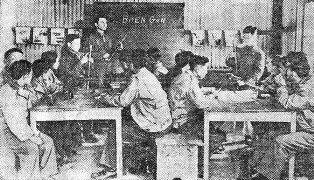 STUDENT INTERPRETERS must be thoroughly familiar with all weapons used by the U.S. Army in the training of
Chinese troops. Here they study a Bren gun, part by part, under the direction of an American captain.
STUDENT INTERPRETERS must be thoroughly familiar with all weapons used by the U.S. Army in the training of
Chinese troops. Here they study a Bren gun, part by part, under the direction of an American captain.
|
|
BRE Get Service
"Award Of Merit"
KUNMING - The Meritorious Service Unit Plaque has been awarded to the Burma Road Engineers, five attached units, and attached Medical, Ordnance and Signal personnel, it was announced here this week by Col. Robert F. Seedlock, BRE commanding officer.
The special citation, authorized by the War Department for units deserving special recognition, was awarded to construction, topographical, maintenance, medical and headquarters units for their work on the Tengchung Cutoff of the Stilwell Highway.
In passing on the citation, Col. Seedlock told his men they "had done the impossible, and I want to thank each and every one of you for your splendid devotion to duty and your cooperation with our Chinese allies which culminated in opening the Tengchung Cutoff on January 20, 1945."
Seedlock says the BRE still has much work ahead of them, but "I am confident that the same spirit and determination you have already shown will lick the toughest military road building job in this war."
The Meritorious Service Unit Plaque is a dark mahogany shield, 14 inches in height, upon which appears a green laurel wreath, the word "Service" above and the words "Award of Merit" below in gold color letters.
In addition to the plaque which goes to the individual units, each of the men is entitled to wear a sleeve insignia consisting of a two inch square of olive drab cloth on which appears a golden yellow laurel wreath one and five-eighths inches in diameter.
"Thunder Dragons" Overseas 2 Years
AN ADVANCED CHINA AIR BASE - The completion of two years of successful combat service has just been celebrated by members of the "Thunder Dragons" fighter group, now operating from an advanced base of Brig. Gen. Russell E. Randall's West China Raiders.
"Thunder Dragon" planes were in the sky as their second anniversary of overseas service rolled around, carrying out the fighter sweeps that have cost the Japs heavily in aircraft, locomotives, trucks, troops and ground installations.
The "Thunder Dragons" first saw action during the North Africa invasions, carrying out some of the longest over-water flights ever attempted by single engine planes, flying from England to French Morocco in support of the invasion forces.
|
Their activity during the Tunisian campaign was highlighted by the air support which they furnished, which was credited in part for the stopping of Rommel's thrust through the Kasserine Pass.
After a period of flying coastal patrol protecting Allied convoys in the Mediterranean, they played a major part in the air work against the strategic island fortress of Pantelleria, in the Mediterranean, flew fighter sweeps against German convoys in Albania, and furnished air cover for the landings on the Anzio beachhead in Italy.
"Thunder Dragon" personnel are proud of "being there when it happened." They were in Casablanca during the "Conference." Pilots of the organization were chosen to fly escort for the President's planes during the Teheran Conference and during their overseas trick the group has been commended by Lt. Gen. Doolittle, Lt. Gen. Spatz, Capt. Eddie Rickenbacker and Donald Nelson, among others.
The rewards which the personnel of the "Thunder Dragons" have received reflect the high type of work that they have performed. The members of the group have received five Silver Stars, 63 Distinguished Flying Crosses, 142 Air Medals, to which 145 Oak Leaf Clusters have been added, one Soldier's Medal, seven Purple Hearts and two Bronze Stars.
|
"Fly When Birds Walk"
A 14TH AF BASE IN WESTERN CHINA - While most of the pilots in the China Theater are still sweating out their first 100 missions, nine members of a Liaison Squadron of the 14th Air Force have double that number of missions to their credit.
Flying the Army's L-5's - very much like the civilian two-seaters which are stock property at most municipal flying schools - without armor and in all kinds of terrain and weather, in the past six months alone the squadron's missions number more than 6,500 and the pilots of the outfit have amassed more than 10,000 hours in this time.
The Liaison outfit, which is now under the command of Maj. William E. Surginer, Hensley, Ark., began full-scale operation in May 1944, with the opening of the Salween campaign. The small planes flew dismantled 75mm howitzers up to the front, served as target spotters for the Chinese artillery, carried messages, and evacuated the sick and wounded.
S/Sgt. Joe Edmunds, Birmingham, Mich., at the end of the first year's operation leads the squadron with 239 missions. Other pilots in excess of 200 missions are: M/Sgt. Gillman, Decorah, Iowa; M/Sgt. Jim Allt, Dorchester, Mass.; T/Sgt. Frank Heidelbauer, Nemaha, Iowa; T/Sgt. Cyrus Wright, Independence, Mo.; T/Sgt. Paul Hovey, Oberlin, Ohio; T/Sgt. James G. Campbell, Watertown, N.Y.; S/Sgt. Ben Waterman, Taylorville, Ill. and S/Sgt. Dave Muir, Birmingham, Ala.
Often in the face of enemy fire the L-5's have made observation and reconnaissance missions over enemy installations and positions. Several of the sergeant-pilots have encountered Zeros and other enemy planes but have gotten their baby planes back safely by outflying and outthinking the heavily-armed Japs.
For the evacuation of wounded practically right on the battle-line the L-5's are unparalleled. Landing at improvised strips that are too rough and short for any other type of aircraft, they have saved the lives of countless soldiers.
For units dependent upon them for food, ammunition and other supplies - not the least of which is PX rations - the little ravine-hopping L-5's have become known as "Angels from Heaven" in places that are 10 days from the nearest supply bases by pack mule.
During the siege of Tengchung, operating from an airstrip which the Japs within the city could plainly see, the liaison pilots calmly carried out their job of evacuating the wounded and bringing-in much-needed food, ammo, medicine and gasoline. At the same time other elements of the squadron were circling overhead spotting Japanese camouflaged positions and batteries.
In every outfit there are pilots who can "shoot the breeze," but some of the narrow escapes of the "Cubmen" read like lines from some work of GI fiction.
T/Sgt. Wladislaw J. Machiewicz, Buffalo, N.Y., was piloting a colonel on an artillery mission over Sungshan when he was jumped by four Oscars. The sergeant tried to lure them over a hill which was a nest of anti-aircraft guns, but the Japs have learned such respect for the little Cubs that they refused to accept the tempting bait, but Machiewicz got away.
On another occasion M/Sgt. Jim Allt, Dorchester, Mass., and T/Sgt. Frank Heidelbauer, Nemaha, Iowa, were caught in the Salween River gorge with six Zeros after them, but after almost and hour and a half of playing
|
Sometimes an L-5 is lost. It took 13 Zeros to down T/Sgt. Charles Devine, Quitman, Ga., and T/Sgt. Paul Hovey, Oberlin, Ohio. The boys were forced to make a crash landing, and then for 15 minutes the Japs tried to strafe the two pilots, but the two of them are still around to tell the tale.
Not all of this splendid record, however, is due entirely to the efforts of the flying men. It is the proud boast of the squadron that, during the year's operation, not a single plane has been lost due to engine failure or structural faults.
In charge of maintenance and engineering is T/Sgt. Paul Hendershott, Warrenton, Mo. The high spot in the maintenance record for the year came last October when the L-5's were operating at one of the forward bases.
Working under field conditions, Sgt. Ed Billingley, Brockway, Pa., and Corp. Billy Herman, Towanda, Pa., salvaged the tail of an L-5 that had washed out and welded it to another L-5 that had just had its rear section shot off in a strafing attack. The whole operation, with a minimum of tools and spare parts took just five hours, and the plane was ready to take off for combat operations.
At a recent ceremony, thirty members of the Liaison Squadron were presented with a total of 44 medals for their part in the now historic Salween Campaign, by Brig. Gen. J. C. Kennedy.
Nor was it the first time that the squadron had been the recipient of decorations. Last Fall Gen. Joseph W. Stilwell, then in command of the China-Burma-India Theater, presented medals to the men for their work in the drive to open the road that now bears his name.
The CHINA LANTERN is the weekly newspaper of the United States Forces in the China Theater and is published by Lt. Lester H. Geiss, Editor-In-Chief, for military personnel only. T/Sgt. Harry Purcell, Managing Editor; Sgt. Maurice Pernod, Production Chief. Editorial offices: Hqrs., SOS, China Theater, Kunming, China, and Hqrs., SOS, Calcutta, India. Printed by Ajit Kumar Sinba at the "Amrita Bazar Patrika" Press.

MARCH 23, 1945
Adapted from the original issue of The China Lantern
Copyright © 2007 Carl Warren Weidenburner
TOP OF PAGE PRINT THIS PAGE ABOUT THIS PAGE
SEND COMMENTS CLOSE THIS WINDOW
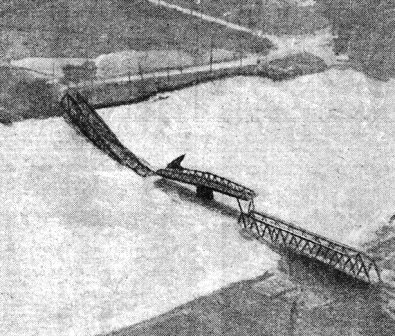 THE 110-FOOT MAIN SPAN of the Jap railroad bridge Nink Bink, in Indo-China, wrecked by a single bomb from
a medium bomber of the Jiggs Squadron. "Glip" bombing tactics, developed by the Falcon Group, were employed in
the raid.
THE 110-FOOT MAIN SPAN of the Jap railroad bridge Nink Bink, in Indo-China, wrecked by a single bomb from
a medium bomber of the Jiggs Squadron. "Glip" bombing tactics, developed by the Falcon Group, were employed in
the raid.
 TALENT AND SHEER PERSONALITY have carried alluring Leslie Brooks to
Hollywood's heights. Leslie will next
be seen in Columbia's Technicolor production "Tonight and Every Night," which brings the net total of her
personality into full play.
TALENT AND SHEER PERSONALITY have carried alluring Leslie Brooks to
Hollywood's heights. Leslie will next
be seen in Columbia's Technicolor production "Tonight and Every Night," which brings the net total of her
personality into full play.
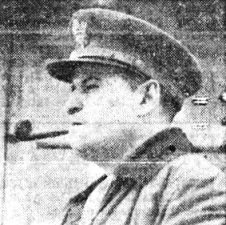
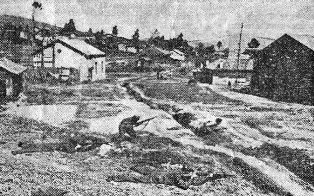 LAST PHASE OF THE TRAINING for the Chinese students are these exercises in the field. Here willing Chinese
students advance on an objective.
LAST PHASE OF THE TRAINING for the Chinese students are these exercises in the field. Here willing Chinese
students advance on an objective.
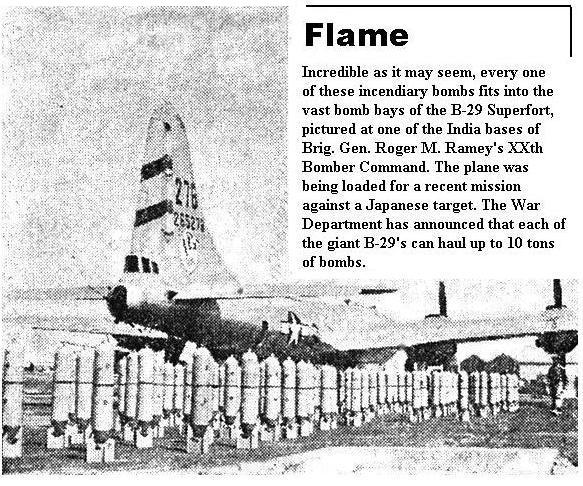
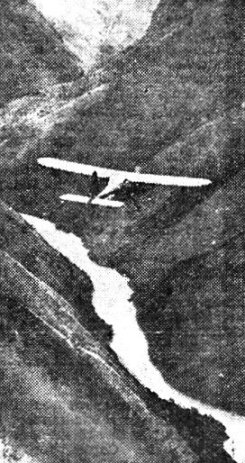 No longer a puddle jumper is the Army's L-5 which became a full-fledged "hump-jumper" in operations in Burma
last fall and winter.
No longer a puddle jumper is the Army's L-5 which became a full-fledged "hump-jumper" in operations in Burma
last fall and winter.
